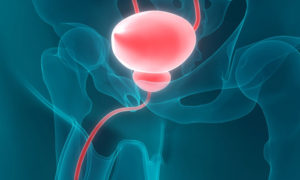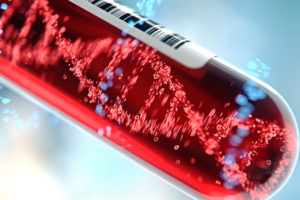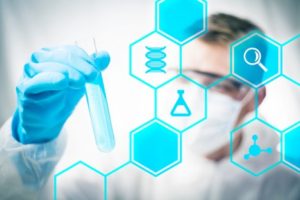Urinary Bladder Cancer Specimens
Bay Biosciences provides high quality, clinical grade bio-samples, cryogenically preserved biopsy tissue, FFPE blocks, sera (serum), plasma and peripheral blood mononuclear cells (PBMC) biofluid specimens from patients diagnosed with Bladder Cancer. The sera (serum), plasma and PBMC samples are processed from patient’s peripheral whole-blood using customized collection and processing protocols. The bladder cancer bio-specimens are collected from unique patients diagnosed with bladder cancer and are provided to a valued pharmaceutical customer for genomics, proteomics, biomarker research, development and drug discovery.
Urinary Bladder Cancer
Bladder cancer is a type of cancer that begins in the cells of the urinary bladder. The bladder is a hollow muscular organ in your lower abdomen that stores urine. Bladder cancer most often begins in the cells (Urothelial cells) that line the inside of the bladder. Urothelial cells are also found in the kidneys and the tubes, ureters that connect the kidneys to the bladder. Urothelial cancer can develop in the kidneys and ureters, too, but it’s much more common in the bladder.

Most bladder cancers are diagnosed at an early stage, when the cancer is highly treatable. But even early-stage bladder cancers can come back after successful treatment. For this reason, patients with bladder cancer typically need follow-up tests for years after treatment to look for bladder cancer that recurs.
Signs and Symptoms of Bladder Cancer
Bladder cancer signs and symptoms may include the following:
- Blood in urine (hematuria), which may cause urine to appear bright red or cola (brown) colored, though sometimes the urine appears normal and blood is detected on a diagnostics lab test
- Frequent urination
- Pain with urination
- Back Pain
Causes of Bladder Cancer
Bladder cancer begins when cells in the bladder develop changes, gene mutation in their DNA. A cell’s DNA contains instructions that tell the cell what to do. The changes tell the cell to multiply rapidly and to go on living when healthy cells would die. The abnormal cells form a tumor that can invade and destroy normal body tissue. In time, the abnormal cells can break away and spread or metastasize through the body.
Types of Bladder Cancer
- Urothelial carcinoma- Urothelial carcinoma, also called transitional cell carcinoma, occurs in the cells that line the inside of the bladder. Urothelial cells expand when your bladder is full and contract when your bladder is empty. These same cells line the inside of the ureters and the urethra, and cancer can form in those places as well. Urothelial carcinoma is the most common type of bladder cancer in the United States.
- Squamous cell carcinoma- Squamous cell carcinoma is associated with chronic irritation of the bladder, for instance, from an Infections or from long-term use of a urinary catheter. Squamous cell bladder cancer is rare in the United States. It’s more common in parts of the world where a certain parasitic Infections (schistosomiasis) is a common cause of bladder Infections.
- Adenocarcinoma- Adenocarcinoma begins in cells that make up mucus-secreting glands in the bladder. Adenocarcinoma of the bladder is very rare.
Risk factors of Bladder Cancer
Factors that may increase bladder cancer risk include:
- Smoking- Smoking cigarettes, cigars or pipes may increase the risk of bladder cancer by causing harmful chemicals to accumulate in the urine. When you smoke, your body processes the chemicals in the smoke and excretes some of them in your urine. These harmful chemicals may damage the lining of your bladder, which can increase your risk of cancer.
- Increasing age- Bladder cancer risk increases as you age. Though it can occur at any age, most patients diagnosed with bladder cancer are over the age of 55.
- Being male- Men are more likely to develop bladder cancer than women.
- Exposure to certain chemicals- Your kidneys play a key role in filtering harmful chemicals from the bloodstream and moving them into your bladder. Because of this, it’s thought that being around certain chemicals may increase the risk of bladder cancer. Chemicals linked to bladder cancer
risk include arsenic and chemicals used in the manufacture of dyes, rubber, leather, textiles and paint products. - Previous cancer treatment- Treatment with the anti-cancer drug cyclophosphamide increases the risk of bladder cancer. People who received radiation treatments aimed at the pelvis for a previous cancer have a higher risk of developing bladder cancer.
- Chronic bladder inflammation- Chronic or repeated urinary infections or inflammations (cystitis), such as might happen with long-term use of a urinary catheter, may increase the risk of a squamous cell bladder cancer. In some areas of the world, squamous cell carcinoma is linked to chronic bladder inflammation caused by the parasitic infection known as schistosomiasis.
- Personal or family history of cancer. If you’ve had bladder cancer, you’re more likely to get it again. If one of your blood relatives, a parent, sibling or child has a history of bladder cancer, you may have an increased risk of the disease, although it’s rare for bladder cancer to run in families. A family history of Lynch syndrome, also known as hereditary nonpolyposis colorectal cancer (HNPCC), can increase the risk of cancer in the urinary system, as well as in the colon, uterus, ovaries and other organs.

Detailed clinical data, elevated levels of antibodies, serology, biomarkers, cystoscopy, CT urogram, PET, MRI, genetic information, urine cytology, biopsy tissue, pathology annotations associated with the bladder cancer specimens.
The bladder cancer sera (serum), plasma and peripheral blood mononuclear cells (PBMC) biofluid samples are processed from patients peripheral whole-blood using customized collection and processing protocols provided by the researcher.
Bay Biosciences is a global leader in providing researchers with high quality, clinical grade, fully characterized human tissue samples, bio-specimens and human bio-fluid collections from cancer (tumor) tissue, cancer sera (serum), cancer plasma, cancer PBMC and human tissue samples from most other therapeutic areas and diseases.
Bay Biosciences maintains and manages it’s own bio-repository, human tissue bank (biobank) consisting of thousands of diseased samples (specimens) and from normal healthy donors available in all formats and types. Our biobank procures and stores fully consented, deidentified and institutional review boards (IRB) approved human tissue samples and matched controls.
All our human human tissue collections, human specimens and human bio-fluids are provided with detailed samples associated patient’s clinical data. This critical patient’s clinical data includes information relating to their past and current disease, treatment history, lifestyle choices, biomarkers and genetic information. Patient’s data is extremely valuable for researchers and is used to help identify new effective treatments (drug discovery & development) in oncology, other therapeutic areas and diseases. This clinical information is critical to demonstrate their impact, monitor the safety of medicines, testing & diagnostics, and generate new knowledge about the causes of disease and illness.
Bay Biosciences banks wide variety of human tissue samples and biological samples including cryogenically preserved -80°C, fresh, fresh frozen tissue samples, tumor tissue samples, FFPE’s, tissue slides, with matching human bio-fluids, whole blood and blood derived products such as serum, plasma and PBMC’s.
Bay Biosciences is a global leader in collecting and providing human tissue samples according to the researchers specified requirements and customized, tailor made collection protocols. Please contact us anytime to discuss your special research projects and customized human tissue sample requirements.
Bay Biosciences provides human tissue samples (human specimens) from diseased and normal healthy donors; including peripheral whole-blood, amniotic fluid, bronchoalveolar lavage fluid (BAL), sputum, pleural effusion, cerebrospinal fluid (CSF), serum (sera), plasma, peripheral blood mononuclear cells (PBMC’s), saliva, Buffy coat, urine, stool samples, aqueous humor, vitreous humor, kidney stones, renal calculi, nephrolithiasis, urolithiasis and other bodily fluids from most diseases including cancer. We can also procure most human bio-specimens and can do special collections and requests of human samples that are difficult to find. All our human tissue samples are procured through IRB approved clinical protocols and procedures.
In addition to the standard processing protocols Bay Biosciences can also provide human plasma, serum, PBMC bio-fluid samples using custom processing protocols, you can buy donor specific sample collections in higher volumes and specified sample aliquoting from us. Bay Biosciences also provides human samples from normal healthy donors, volunteers, for controls and clinical research, contact us Now.
日本のお客様は、ベイバイオサイエンスジャパンBay Biosciences Japan またはhttp://baybiosciences-jp.com/contact/までご連絡ください。



